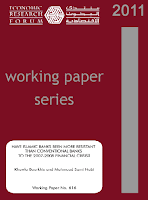A NEW APPROACH TO DERIVATIVES: FINANCIAL ENGINEERING WITH ISLAMIC RULES
ATİLA YANPAR
Capital Markets Board of Turkey, Expert
Despite their importance in financial sector development, derivatives are still not generally accepted as legitimate products in Islamic finance. Conventional derivatives and the world of Islamic financial products has chasm between each other as they have different approaches in important issues like interest and ambiguity. While recent events in the world economy have sparked a global debate on derivatives and the damage caused by them, strict Sharia rules saved Islamic finance institutions from the worst of the crisis. On the other hand, due to lack of sufficient instruments for protection against volatility in currency, interest rate and commodity prices, the ability of Islamic finance institutions to survive future shocks is in question. As the Islamic banks are struggling to develop hedging tools with regard to doubt on their usage casted by religious differences, this article explores the validity of derivatives in accordance with basic legal principles of the Sharia and summarizes the key objections of scholars that challenge the permissibility of derivatives under Islamic law. In conclusion, the article delivers suggestions for Sharia compliance of derivatives and Turkish Derivatives Exchange future contracts. (access here)








